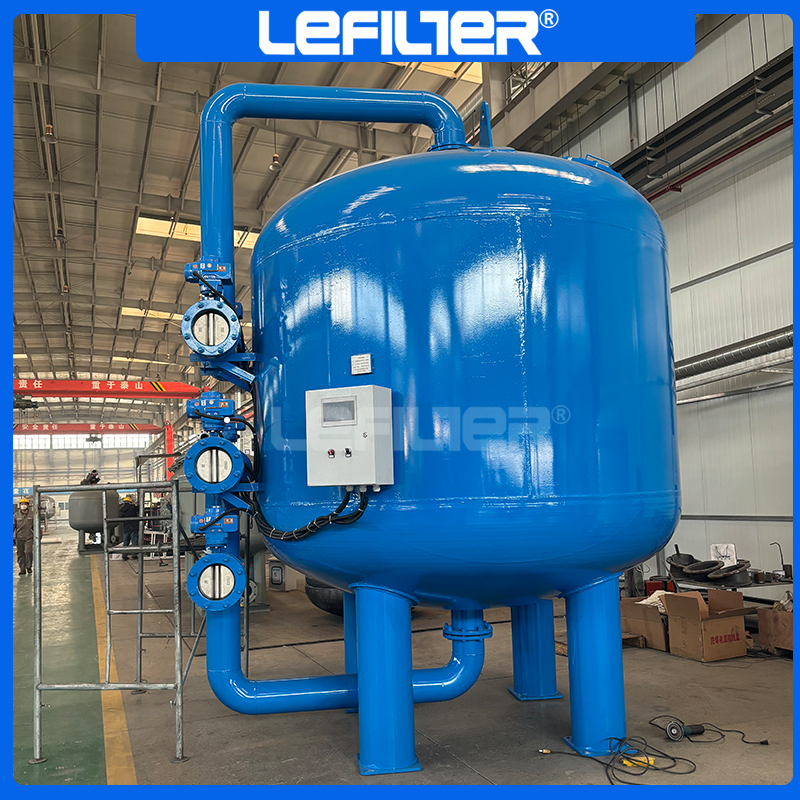Multimedia Filters in Midstream Natural Gas Processing: Ensuring Purity for Efficient Distribution
DATE:2024-11-04 Number of views: 1 Source:dongwenhui
The midstream sector of the natural gas industry plays a crucial role in transforming raw natural gas from upstream production into a refined product for downstream consumption. Among the most critical components in this process are multimedia filters, which remove particulate contaminants that could impair the performance of processing equipment and reduce the purity of the final product. Let’s dive into how these filters work, the types of particles they remove, and the overall benefits they bring to the natural gas midstream processing phase.
How Multimedia Filters Function in Midstream Natural Gas Processing
Multimedia filters, typically composed of layers of materials like anthracite, sand, and gravel, are designed to capture particles of various sizes from gas or liquid streams. The filtering process often follows these steps:
Pre-Treatment: Here, larger particles are removed in initial stages to prevent clogging and prepare the flow for finer filtration.
Multilayer Filtration: As gas flows through each layer, progressively finer particles are removed, which is essential to maintain the desired gas purity.
Backwashing: To keep the filters effective, periodic backwashing removes the accumulated particulates from the media layers, allowing the filters to maintain high efficiency.
In natural gas processing, this method is highly effective at handling the unique challenges posed by particulates in gas, including black powder and other contaminants that could corrode pipelines or damage downstream equipment.

Challenges Addressed by Multimedia Filters
1. Particle and Chemical Contaminant Removal
Natural gas from upstream production can contain various particles, including black powder, which consists of iron sulfide, iron oxide, and other corrosive elements. This contamination not only clogs pipes but can also affect the quality and integrity of equipment further downstream, potentially increasing maintenance costs and downtime. Removing such impurities ensures that the gas meets stringent quality standards before it enters the distribution network.
2. Enhancing Equipment Longevity and Efficiency
Filters are essential for keeping machinery like compressors and turbines free from corrosive particles. By removing impurities, multimedia filters protect these sensitive components, leading to extended operational life and reduced need for frequent maintenance. This also helps optimize equipment efficiency, as clean filters facilitate a smoother flow of gas through the processing stages, reducing pressure drops.
3. Environmental Compliance and Safety
Environmental standards require that processing plants adhere to strict regulations regarding the release of contaminants. Effective filtration not only protects the immediate equipment but also prevents harmful elements from escaping into the environment, ensuring compliance with safety and environmental guidelines.
The Economic Benefits of Multimedia Filtration in Midstream Gas Processing
Investing in high-performance filtration can yield substantial economic benefits. Reduced maintenance and downtime save on operational costs and prevent costly shutdowns. Moreover, improved gas purity can make a processing facility more competitive, especially as industries and end-users increasingly value cleaner energy sources.
Filtration systems, when used effectively in the midstream phase, also allow for minimal product loss and fewer unplanned stoppages due to clogged or damaged equipment. Over time, these benefits contribute to the financial stability and profitability of midstream operators.
FAQ
What types of contaminants do multimedia filters remove in natural gas processing?
Multimedia filters effectively remove particles like black powder, iron oxide, and iron sulfide, which can corrode and damage pipelines and equipment.
How often do multimedia filters need to be maintained?
They typically require periodic backwashing, which depends on the contamination load and operational flow rates, ensuring they remain efficient without frequent replacements.
Can multimedia filters handle high-pressure gas streams?
Yes, multimedia filters are designed to handle the high pressures in natural gas processing, ensuring consistent particle removal even under such conditions.
Are multimedia filters reusable?
While the media layers are reusable with proper backwashing, they may need occasional replacement if they become saturated or worn out over time.
What is black powder, and why is it a concern in gas pipelines?
Black powder is a mix of various contaminants, including iron sulfide and oxide, that form due to corrosion. It causes clogging and accelerates wear on pipelines and equipment.
How do multimedia filters benefit the environment?
By capturing harmful particles before they enter the atmosphere or water sources, these filters help ensure compliance with environmental regulations and reduce ecological impact.
Is multimedia filtration energy-efficient?
Yes, properly maintained multimedia filters operate with minimal energy input, as they prevent clogs that would otherwise increase the system's energy demands.
How does multimedia filtration affect the purity of the natural gas?
By removing fine particles, multimedia filters ensure the gas meets quality standards required for efficient combustion and safe transportation.
Related Products


